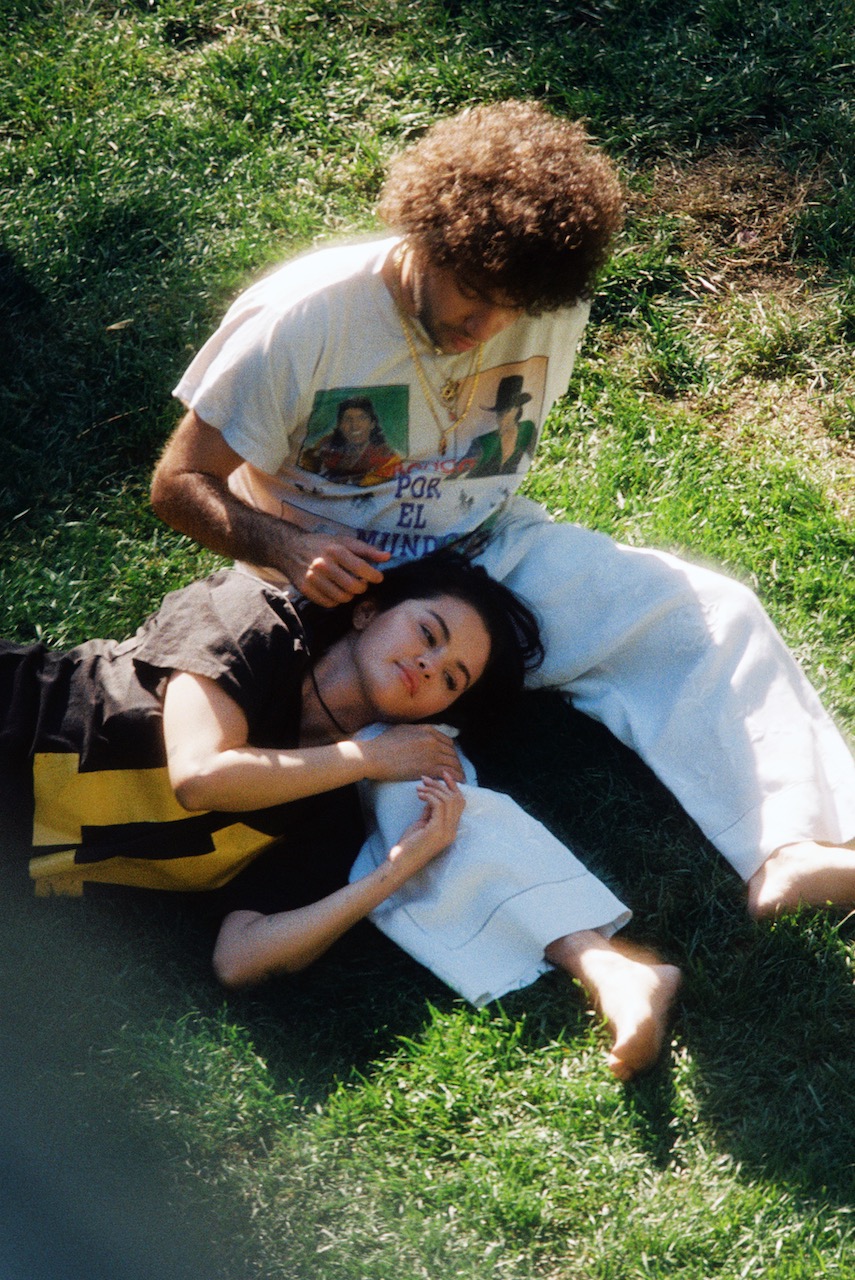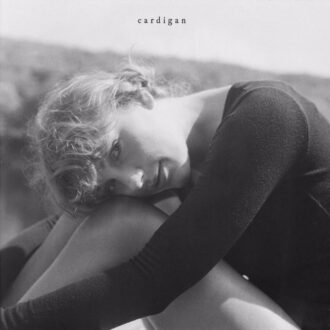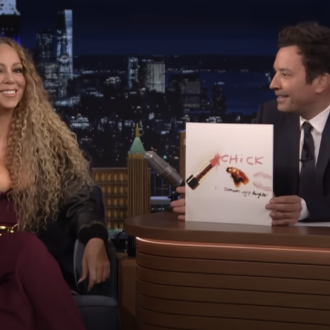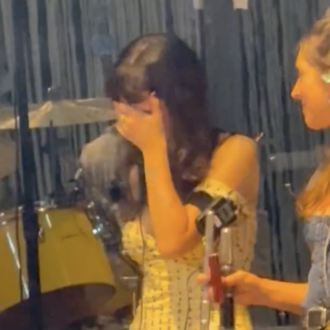The Selena Gomez & Benny Blanco Album Is A Full-Circle Moment

Petra Collins
Selena Gomez might not be your favorite pop star’s favorite pop star, but she’s probably got a track or two on their favorite playlist. She began her career as an actress on Disney’s Wizards Of Waverly Place, but despite sustaining a decades-long musical career with many Top 10 hits, she’s never quite escaped her former-Disney-kid image. She is quietly a billionaire, largely because of non-musical ventures such as her Rare Beauty makeup line and various luxury endorsements. She continues to be an actress, on notably outre projects, like the Oscar-nominated (albeit rapidly self-discrediting) film Emilia Pérez, and the Emmy-nominated true-crime series Only Murders In The Building with Steve Martin and Martin Short. This goes back to 2013, where Gomez damned her Disney past by starring in A24 and Harmony Korine’s sleazefest Spring Breakers (though she hedged her rep a little by having her character dip out before the real debauchery begins). But there, too, her past precedes her; last year Gomez told The Hollywood Reporter that she frequently sends casting directors anonymous tapes or has her agents withhold her name until she showed up to the audition, so they wouldn’t automatically reject her as Disney fluff.
Soon, Gomez plans to add yet another role to her multihyphenate identity: newlywed. She recently got engaged to veteran pop producer and very veteran jokester Benny Blanco, and to celebrate the engagement, the two artists have released a collaborative album, I Said I Love You First. The title is a true statement, as the couple revealed in an Interview Magazine piece; Gomez indeed said “I love you” first. And throughout the album’s accompanying press junket, they’ve shared even more about their happy soon-to-be-wedded life: cooking elaborate meals together, falling asleep to TV reruns, and whiling away the days snuggling. Relatable, if you can forget the billionaire thing.
Blanco is somewhat less than a celebrity, so here’s a brief introduction. He started his career as a MySpace-era rapper – “I feel like that’s how every white person starts out,” he told Eclipse Magazine in 2008. Like many a producer from rock’s golden era, he paid his dues by making porn music – specifically, beats for a softcore series called Hip-Hop Honeys by The Source’s Jonathan Schecter. (In Eclipse, again: “I was so horny, I was like ‘yeah!”) He joined rapper Spank Rock to make Bangers & Cash, a Miami bass homage with Fruity Loops type beats and 2 Live Crew filth; surprisingly, it holds up. Then he was taken on by newly massive megaproducer Dr. Luke as a protege, and alongside mogul Max Martin and prolific songwriter Bonnie McKee, he cowrote some of the biggest hits of the early 2010s, including Katy Perry’s Teenage Dream and Kesha’s Animal. (Blanco has since distanced himself from Dr. Luke, after Kesha accused him of sexual assault: “I don’t have any relationship to him anymore,” he told NPR in 2018.)
I am on record as a Benny Blanco hater, but I’d actually like to issue a bit of an apology. In an oft-quoted excerpt from John Seabrook’s The Song Machine, McKee shares an anecdote portraying Blanco as the team’s lowest-common-denominator for hire: “Luke always makes us ‘Benny-proof’ everything. He says that if Benny doesn’t get it, America won’t get it.” But that’s an account by Dr. Luke, who is not known for being the nicest guy. By all accounts, Blanco was substantially involved in the actual musical productions by the Martin/Luke team; much as McKee doesn’t get much credit for her toplining work, Blanco doesn’t get enough credit for that.
And Blanco has evolved with the times. Like most of his producer cohort – including Dr. Luke – he’s had to diversify, from having his own signature sound to being able to recreate the signature sound of anyone. He now contains multitudes; he still makes joke trap music like Lil Dicky’s “My Dick Sucks,” but he can also do silken soundscapes, as on Kali Uchis’s “Moonlight,” or reverbed alt-R&B gloom, as on SZA’s “What Do I Do.” Gomez, too, has evolved as a vocalist. Her early hits, like “Love You Like A Love Song” and “Come And Get It,” gave her voice mecha-sized production so it could sound as big as the maximalist tracks it inhabited. But since 2015’s Revival – her first album with Blanco – she no longer disguises her small voice but embraces it. Sometimes, as on career-best “Bad Liar,” her voice sounds conversational. Sometimes, as on A$AP Rocky collaboration “Good For You,” she has an almost aching tone; as Blanco astutely noted in the Interview Magazine piece, she can make even the most confident lyrics sound wistful and wounded.
I Said I Love You First is the product of that evolution. Their collaborators are largely the same people that Gomez has worked with since Revival and that Blanco just had on his album Friends Keep Secrets 2: chameleonic producer Cashmere Cat, gloriously dorky songwriter Julia Michaels, singer-slash-ascended Swiftie Gracie Abrams, and producer-slash-brother-of-Billie-Eilish Finneas O’Connell. Gomez often sounds like a diffuse version of her cowriters – her vocal stylings owe a lot to Michaels – and she sounds especially so here; Blanco said something else astute in that Interview Magazine piece, but not in the way he thought it was: “Nobody’s ever going to hear a song of hers and be like, ‘Oh, I wonder if that’s Selena Gomez.'”
Here, the wondering goes in the opposite direction; you instantly know which artist most of these songs are going for. Charli XCX and Dylan Brady of 100 gecs give Gomez “Bluest Flame,” probably a Brat offcut; Gomez sounds like its demo vocal. I have no idea why “Don’t Wanna Cry” wasn’t a single, as it’s a pristine example of the disco sophistipop that the Weeknd and others have spent 10+ years perfecting. Gomez inhabits the tracks with crystalline anonymity – perhaps too much, as the noticeably extensive vocal production kind of sounds like an AI upscaling. On “Ojos Tristes,” another standout, Selena is shrouded behind two layers of influence. The dreampop sound comes from suddenly buzzy band the Marías, who do most of the vocals, and the lilting melody is interpolated from “El Muchacho de los Ojos Tristes,” a 1981 single and beloved cult hit by Spanish folk-pop artist Jeanette – kind of like the Latin-indie equivalent of Margo Guryan. A couple artists aren’t present on the album but very much present in pastiche, like folk-rock era Taylor Swift and – especially – Lana Del Rey. (The Lana pastiches sound oddly like the ones on Camila Cabello’s C,XOXO, minus the forced edginess.)
That being said, Gomez has a longstanding history with pretty much everyone here. Blanco bragged about Gomez to Rolling Stone – he’s been doing a lot of bragging this album cycle – that she was a huge, undersung influence on the pop music of the 2020s, and he wasn’t just being a wife guy. Selena Gomez has known Taylor Swift since the days when people were still talking about the Squad. “Bluest Flame” isn’t the first time Selena’s sound has blurred into Charli’s: “Same Old Love” was to Sucker what “Bluest Flame” is to Brat. And even Lana’s breakout hit “Video Games” was produced by a Blanco protege, Daniel Omelio. Gomez and Blanco were indeed there from the start, and so much of I Said I Love You First has the feel of coming full circle.
The one thing I Said I Love You First doesn’t have are love songs. There are sex songs, sure. Some are fairly tasteful. “Cowboy” has no yeehaw but the sleek poise of someone who wears makeup to bed; Gomez coos that “You want me to act like the bad girls,” then an uncredited GloRilla hijacks the track to demonstrate what an actual baddie sounds like. Others have the distinctive vibe of that viral horny press release by comedian-turned-tinned-fish-upseller Caroline Goldfarb for Meghan Trainor’s own newlywed album The Love Train. “Sunset Blvd” weds a pretty chorus about public sex (“Making you famous, everyone’s watching”) to a prechorus about how much she wants his big! Big!!!! Hard!!! Heart! Obviously this doesn’t work, but not because of the innuendo – no sex joke slander shall be entertained here – but because a “hard heart” is neither a compliment nor something particularly associated with Benny Blanco. And the song’s structure is so rigid and repetitive that the prechorus just looms.
As for love, though, not only does Gomez sing about multiple relationships here rather than the one from the promo, but she particularly dwells on breakups, insecurities about exes, and ambiguous enmeshments. She even frontloads these. “Younger And Hotter Than Me,” a close-miked cross between Swift and the Moldy Peaches (a stated influence), is half vulnerable confession and half a stealth diss at a guy whose dating history follows the Leonardo DiCaprio age-gap graph. Next is the chipper “Call Me When You Break Up,” a song about missing a friend told through the language of an emotional affair. (It’s also got the album’s best joke: When her crush does actually call, she backpedals the whole song to tell them that she totally wants to be there for their wedding, because she’s always there for him in a completely un-sus way.) Sometimes Gomez inhabits two sides of the same heartbreak: She watches her ex kiss someone else in front of her on “Don’t Wanna Cry,” then revels in doing that revenge kissing on “How Does It Feel To Be Forgotten.”
What’s the point of a big relationship album without the relationship? For Blanco, it’s obvious: He clearly wants to escape his old fratty image, exemplified in a now-buried Reddit AMA where he introduces himself as “a record producer, songwriter, and masturbator,” shares that he “just ate babaganush… have lots of gas!!!” and shares studio anecdotes about GHB, horse cocks, and slapping ass cheeks for a snare drum sound. Gomez’s motivations are more opaque. (There’s a reason most of the quotes in this column are from Benny Blanco.) I Said I Love You First kind of feels like she’s getting her songs out the door so she can move on. The album even exhumes her reggaeton single “I Can’t Get Enough” from the 2010s, finally getting it released.
This isn’t just speculation on my part, though; Gomez has been insinuating for a while that she’d like to retire from music, and ramped it up last year during the Emilia Pérez press cycle, telling the SmartLess podcast: “I feel like I have one more album in me.” The bio on her Instagram – one of the most popular accounts on the site – introduces her as the founder of Rare Beauty and the “founder/CIO” of “mental fitness ecosystem” Wondermind; while her album gets a cursory mention, she doesn’t identify herself as a singer. If you wanted to be cynical, you might point out that music contributed very little to her billion-dollar net worth compared to her other ventures. You could point to her peers’ similar pivots; artists have long had extramusical ventures like fashion lines or perfumes (Gomez has two), but lately they’re becoming less like dilettantish side gigs and more like their primary careers. Dua Lipa seems to want to found a Goop-esque lifestyle media empire. Rihanna has abandoned music entirely, maybe permanently, to focus on her Fenty Beauty juggernaut.
There’s a less cynical reason, though. I Said I Love You First implicitly promises a glimpse into Gomez’s personal life – down to the cover art, a faux-voyeuristic glimpse through a keyhole of Gomez and Blanco in bed – but Gomez simultaneously seems wary that someone might actually do that. In an ominous recombination of two industry trends – the spate of stream-chasingly “deluxe” album editions and the Genius-fueled demand for lyrics explainers – the album was released alongside a commentary track, I Said I Love You First – Explained, in which Selena Gomez explains almost nothing. Here’s the story behind “How Does It Feel to Be Forgotten”: “A lot of people like to dissect my music, and I can tell you that this specific song [is] much more about what we’ve experienced. It’s not my past, it’s more just – it’s just an honest song and I think that’s all I wanted it to be.”
If Gomez sounds defensive here, it’s because she dated Justin Bieber at the peak of his fame, which subjected her to a level of tabloid scrutiny and gossip notoriety she clearly didn’t like. Like every pop artist, she’s also all too familiar with the parasocial prying that comes with being famous these days. In that Hollywood Reporter interview, she said something telling about where her mind is: “It’s really scary to talk about music that maybe has been a part of your story and isn’t anymore…. But every interview I’ve done for [Emilia Pérez], there’s not been one personal question asked, and I’ve wanted to kiss every single reporter in the mouth and just say, thank you.” And when asked what the acting world gave her that the music world did not, she answered in one word: “Sanity.”
It’s hard to fault her here. Gomez has been open about how much superstar fame has affected her mental health. In a way, she’s now living the dream: being successful without being famous. Perhaps she’ll find she’s got another album in her still; perhaps she’ll leave the music world behind, content to have shaped its sound. But we’ll always have “Bad Liar.”
POP TEN
Chappell Roan - "The Giver"
If “Cowboy” has zero yeehaw; “The Giver” has infinite. Chappell Roan has teased her country pivot for several months now, since she performed it on SNL last November. Throughout the past few weeks, she’s staged a genius promotional campaign of infomercial-esque billboards packed with details and Easter eggs, complete with a phone number to CALL NOW! (If you do call it, you get a song snippet.) The campaign’s got continuity: After doing a homage to the Village People’s signature song in “HOT TO GO!”, she’s now done a homage to their signature sexed-up personas: portraying a plumber, detective construction worker, dentist, and lawyer who will work hard for you in every way.
But make no mistake, the song’s as killer as the promo: a meaty tribute to the country-pop of ’90s Shania, with its big hooks and big vocals, and also to the power of la-la’s, na-na’s, and doot-do’s. Chappell’s dipped into country before, most notably on “Red Wine Supernova” and “California,” but never with this much showy, campy panache.
Lil Nas X - "HOTBOX"
Last year’s “J Christ” didn’t go so well for Lil Nas X; undoubtedly it would have been tempting to play it safe after the massive fallout. Tempting for people besides Lil Nas X, that is. This 2000s Pharrell homage might not yet have big viral numbers, but – crucially – it has the big hooks, and they get bigger every time you think it’s hit its ceiling. And the Barbiecore video, while perhaps a year or two late to the trend, proves once again that Nas is forever dedicated to the aesthetic.
Alex Warren - "Ordinary"
The latest single that will soon commandeer adult hits radio combines the romantic mushiness of Benson Boone with the gospel-sized mound of sound of Hozier or Teddy Swims. But the 2020s incarnation of this kind of thing is better than the 2010s version, or at least it sounds that way when I haven’t yet experienced it through thousands of coffee shop speakers. I don’t often say this, but “Ordinary” would benefit from a stripped-down version; that faux-harp intro is genuinely nice.
Amerie - "Mine"
Many of the big R&B stars of the 2000s have quietly been releasing music outside the mainstream R&B ecosystem that could match up against any of the artists who’ve blatantly ripped their sound to much bigger fame. Amerie, the artist behind “1 Thing,” has also moved on to other ventures – namely, a YouTube book club and a forthcoming debut novel – and hasn’t released new music since 2018. “Mine” literally just came out but went directly into the column upon the first few seconds; that’s the kind of turnaround that happens when your catalog includes one of the best songs of the millennium so far. “Mine” has all the same components as modern alt-R&B – a moody, nocturnal track; a sinuous, acrobatic vocal melody; and a DeBarge-ish piano line that twinkles subtly in the mix – and yet sounds hauntingly out of time.
Emilia, TINI, Nicki Nicole - "Blackout"
Argentinian artist Emilia heralds in Latin pop’s hyperpop era?? That’s a huge exaggeration – “Blackout” is more accurately described as “having light PC Music influences” – but I like where this trend, if it’s a trend, is going. (Also: If you haven’t heard Emilia’s Bizarrap session, it’s great.)
Jessie Reyez - "NYB"
R&B singer Jessie Reyez is overdue for a legit megahit, and “NYB” is particularly qualified to be that for her. The single is gloriously slinky and Kaytranada-esque, with a synth solo that evokes a roomful of frosted-glass bricks. (Someone else is gonna have to do the deep digging on which former Knicks player she’s talking about here.
Jonas Brothers - "Love Me To Heaven"
I have never felt more ancient than when a YouTube preroll ad presented me with the words “20 years of Jonas.” (One might say I felt, as this song puts it, a “lonely vintage aching in my chest.”) “Love Me To Heaven” is clearly pandering to the die-hards who have also been around for those 20 years, but it’s also a soft-rock track that has substance even for the people who didn’t attend JonasCon. The boys haven’t lost their falsetto, either.
SEULGI - "Baby, Not Baby"
SEULGI, a K-pop artist and former Red Velvet member, is reviving the same Britney eras as Tate McRae, stuffing the old Max Martin sound with more variety and more hooks – but Tate McRae has yet to just straight namedrop “Oops! I Did It Again,” as SEULGI does here.
Miso Extra - "POP"
If you name a song “POP,” you are committing to not just write a pop song, but the platonic ideal of pop. (Or at least some kind of mission statement, as ‘N Sync did.) Hong Kong-born Japanese artist Miso Extra, who’s coming off a near-interrupted string of killer singles, delivers: This is shiny, bubblicious bliss.
CLOSING TIME
is it stolen valor for bottoms to do the new chappell roan song at karaoke? the greatest thread in the history of forums, locked by a moderator after 1328 pages of heated debate
— Emily C. Hughes (@emilyhughes.bsky.social) March 25, 2025 at 11:08 AM



